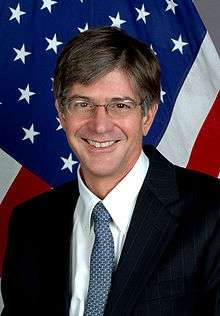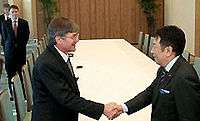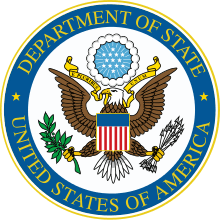James Steinberg
| Jim Steinberg | |
|---|---|
 | |
| 16th United States Deputy Secretary of State | |
|
In office January 29, 2009 – March 30, 2011 | |
| President | Barack Obama |
| Preceded by | John Negroponte |
| Succeeded by | William Joseph Burns |
| Deputy National Security Advisor | |
|
In office December 23, 1996 – August 1, 2000 | |
| President | Bill Clinton |
| Preceded by | Sandy Berger |
| Succeeded by | Stephen Hadley |
| Director of Policy Planning | |
|
In office March 21, 1994 – December 23, 1996 | |
| President | Bill Clinton |
| Preceded by | Samuel W. Lewis |
| Succeeded by | Gregory B. Craig |
| Personal details | |
| Born |
May 7, 1953 Boston, Massachusetts, U.S. |
| Political party | Democratic |
| Spouse(s) | Sherburne Abbott |
| Children | 2 |
| Alma mater |
Harvard University Yale University |
James Braidy "Jim" Steinberg (born May 7, 1953)[1] is an American academic and political advisor, and former Deputy Secretary of State. He is currently a Professor of Social Science, International Affairs, and Law at the Maxwell School of Citizenship and Public Affairs at Syracuse University.
Biography
Early career
Steinberg was born to a Jewish family in Boston, Massachusetts.[2] He was educated at Phillips Academy (1970), Harvard College (1973), and Yale Law School (1978).[2] His previous positions included a senior fellowship for US Strategic Policy at the International Institute for Strategic Studies in London, UK (1985–1987), and senior analyst at RAND Corporation (1989–1993). Steinberg also served as a Senior Advisor to the Markle Foundation (2000-2001) and was a member of the Markle Task Force on National Security in the Information Age.
Carter campaign
During the national elections which brought U.S. President Jimmy Carter into office, Steinberg worked on the presidential campaign of the Carter-Mondale ticket.[3]
Clinton administration
Steinberg served as US State Department Director of Policy Planning (1994–1996), then Deputy National Security Advisor (December 1996 – 2001) to US President Bill Clinton. He also served on the Project on National Security Reform's Guiding Coalition.
Brookings Institution Director and Lyndon B. Johnson School Dean
After serving in the Clinton administration, Steinberg was a senior fellow at the Brookings Institution in Washington, D.C. and the Institution's vice president and director of Foreign Policy Studies (2001–2005). Steinberg was then Dean of the Lyndon B. Johnson School of Public Affairs at the University of Texas at Austin (2006–2009) until his appointment as U.S. Deputy Secretary of State on January 28, 2009, taking a leave of absence from the School for the duration of his term in office.[4]
Obama administration

According to the Wall Street Journal, Steinberg, along with Daniel Kurtzer and Dennis Ross, were among the principal authors of Barack Obama’s address on the Middle East to AIPAC in June 2008, which was viewed as the Democratic Party nominee’s most expansive on international affairs.[5]
He was mentioned as being "at the top" of Obama's list of candidates for the post of National Security Advisor,[6] but Andrea Mitchell reported on November 24, 2008 that Hillary Clinton would appoint Steinberg Deputy Secretary of State.[7] On December 23, 2008, Steinberg himself confirmed the appointment in a letter addressed to students and faculty at the Johnson school.[8]
As Deputy Secretary of State and principal Deputy to US Secretary of State Hillary Clinton,[4] Steinberg notably coined the phrase "strategic reassurance" to describe U.S.-China relations suggestive of the idea that the United States should reassure China about welcoming China's rise while China would reassure the US and its neighbors that it would not conflict with their interests.[9][10]
Israel-U.S. Strategic Dialogue
In October 2010, Steinberg met with Israel’s Deputy Foreign Minister, Danny Ayalon, in Washington, D.C., where they discussed how to improve regional security and stability through boosting and growing the already strong cooperation between their two nations. During the talks, both delegates expressed their commitment to a lasting peace between Israel and its neighbors and their grave concern regarding Iran’s continued non-compliance with its international obligations through pursuit of a military nuclear program.[11]
The following spring, they met in Jerusalem where they again took advantage of the opportunity to work together to identify and strategize against the threats both countries face including the rapidly changing political situation in the Middle East and the ongoing Iranian nuclear program.[12]
Maxwell School Deanship
In March 2011, Steinberg was named Dean of the Maxwell School of Citizenship and Public Affairs at Syracuse University.[13] On July 28, 2011, he resigned as Deputy Secretary of State and assumed his new position.
Think Tanks
Steinberg is a member of the Council on Foreign Relations. He has participated in 8 conferences of the Bilderberg Group (1994, 2000, 2002, 2003, 2006 and 2009-2011).
Publications
- Turning to the Pacific: U.S. Strategic Rebalancing toward Asia, coauthored by James Steinberg, Asia Policy (July 2012)
Personal life
He is married to Sherburne B. Abbott, the director of the Center for Science and Practice of Sustainability at the University of Texas at Austin. They have two daughters: Jenna and Emma.[2]
References
- ↑ date & year of birth according to LCNAF CIP data
- 1 2 3 Jewish Virtual Library: "James B. Steinberg" retrieved October 26, 2013
- ↑ Mazzetti, Mark, "The New Team -- James B. Steinberg," The New York Times, November 8, 2008
- 1 2 US Department of State biography for James B. Steinberg, accessed March 16, 2011 Archived March 10, 2011, at the Wayback Machine.
- ↑ Obama's Mideast Experts Emphasize Talks, Jay Solomon, Wall Street Journal, June 16, 2008; Page A7
- ↑ Want a Security Post? Say Nothing., Helene Cooper, New York Times, November 6, 2008
- ↑ Morning Show Summary., Mark Halperin, The Page, November 24, 2008
- ↑ Smith, Ben (December 23, 2008). "Steinberg confirms appointment". Politico.
- ↑ Currie, Kelley (October 22, 2009). "The Doctrine of 'Strategic Reassurance'". Wall Street Journal.
- ↑ Rogin, Josh (November 6, 2009). "The end of the concept of "strategic reassurance"?". Foreign Policy.
- ↑ "Joint Statement on the U.S.-Israel Strategic Dialogue". U.S. Department of State.
- ↑ "Israel-U.S. Strategic Dialogue".
- ↑ Rogin, Josh (March 30, 2011). "Steinberg leaving State, Burns moves up". Foreign Policy.
External links
- James Steinberg at The American Assembly's Next Generation Project
- James B. Steinberg at US State Department
- Research and commentary at the Brookings Institution
- Appearances on C-SPAN
- James Steinberg on Charlie Rose
- Works by or about James Steinberg in libraries (WorldCat catalog)
- James Steinberg collected news and commentary at Al Jazeera English
- "James Steinberg collected news and commentary". Bloomberg News.
- James Steinberg collected news and commentary at Fox News
- James Steinberg collected news and commentary at The Jerusalem Post
- "James Steinberg collected news and commentary". The New York Times.
- Preventive war, a useful tool (by James Steinberg/Ivo Daalder). December 4, 2005
- Policy Challenges and Opportunities for the United States in Asia (Keynote address from 2010 Asia Policy Assembly, June 17, 2010)
| Political offices | ||
|---|---|---|
| Preceded by Samuel Lewis |
Director of Policy Planning 1994–1996 |
Succeeded by Greg Craig |
| Preceded by Sandy Berger |
Deputy National Security Advisor 1997–2000 |
Succeeded by Stephen Hadley |
| Preceded by John Negroponte |
United States Deputy Secretary of State 2009–2011 |
Succeeded by Bill Burns |
